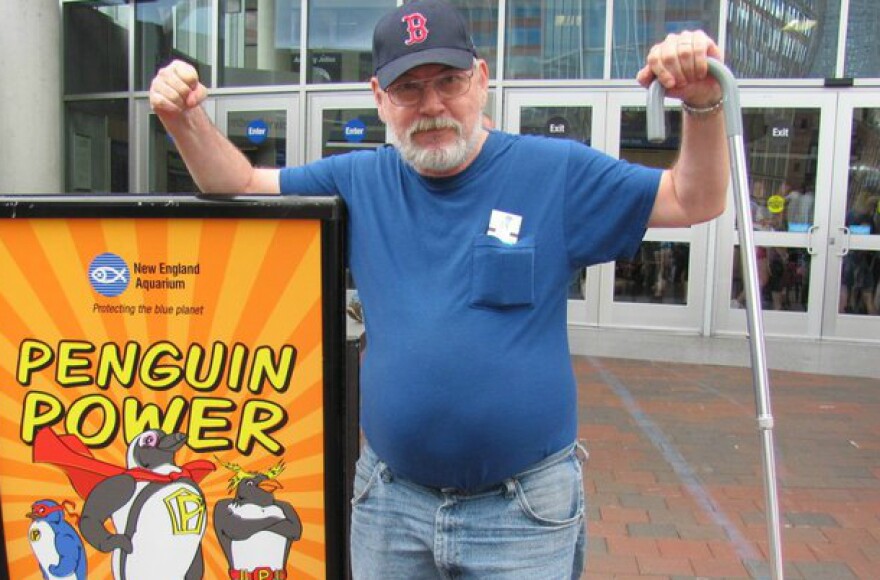Nearly five years ago, a veteran in New Hampshire’s North Country died while waiting for an appointment through the VA Medical Center in White River Junction, Vermont. The hospital says “no significant delay” contributed to his death, but the man’s widow disagrees, and questions remain about the process the hospital used to hold itself accountable.
On the last night of Don Theriault’s life, his son Brian visited his Berlin home for dinner. Don Theriault was 58 years old, a veteran of the Air Force who served during Vietnam. He’d recently moved back to New Hampshire after living on the west coast for more than a decade. Brian Theriault says his father was looking forward to reconnecting with his kids and grandkids.
"And as we were eating, he kept dozing off," Brian Theriault says. "His wife was like, 'Wake up, you’re falling asleep, you’re falling asleep.' And he kept saying, 'I can’t help it. I’m really tired, I’m really tired.'"
Sleeping was dangerous for Theriault. He had sleep apnea, and he’d been trying to get a sleep study done through the White River Junction VA, an appointment his doctors considered urgent, according to sources familiar with his case.
"He says, 'Yeah, I don't know why they're waiting so long,'" Brian Theriault says.
The next morning, Brian Theriault got a call from the local hospital. His father had stopped breathing that night. He’d been hooked up to breathing machines, but he had no brain activity. Don Theriault died that afternoon.

After he was cremated, Theriault's widow and children each got urns of his ashes.
"He wanted them to be spread at his childhood places, like South Pond, was one of the places," Brian Theriault says. But he didn't scatter them. Something about his father's death left him feeling unsettled. He wasn't quite ready to let go.
Nearly two years later, when national attention turned toward how long veterans were waiting for care in VA hospitals across the country, the VA's oversight arm, the Office of Inspector General, or OIG, paid a visit to the VA hospital in White River.
That visit prompted a local VA social worker to write an email to her supervisor.
She declined to be interviewed for this story, but in that email, which NHPR obtained from someone else at the VA, she wrote that maybe Theriault's death "could have been prevented if someone had just given the client an appointment."
So that’s the question. Could his death have been prevented if the VA had given Don Theriault his sleep study?
Al Montoya, director of the White River Junction VA, declined to talk about the hospital’s investigation into Theriault’s case, citing federal law. But he spoke in general about the “peer review” process.
"Where if there's any negative impact whatsoever, we review it ourselves, and make sure that appropriate care was delivered," Montoya says.
That peer review led the hospital to conclude that Theriault died of "an unrelated pre-existing condition." We don’t know how the hospital reached that conclusion. That information is protected under federal law.
However it was made, Theriault’s widow, Debbie Delorey, disagrees with it. She says her husband’s death was caused by his sleep apnea—an ailment she says he’d been waiting for the VA to treat for at least a year.
"If he was on a CPAP machine or had a proper bed, where he could sleep just about sitting up. That was the only way he could breathe halfway normal."
Here’s what we know about Theriault’s official cause of death:
According to his death certificate, Don Theriault died of acute on chronic respiratory failure and septic shock due to aspiration pneumonia. He also had COPD. About twelve hours before he died, something got into his lungs that caused a drop in his blood pressure that led him to stop breathing.
How something got into his lungs we may never know. Without an autopsy, it's all but impossible to figure out what killed a patient with multiple conditions.
Joe Anglin, White River Junction’s former Public Affairs Officer, says doctors there were aware of Theriault’s condition.
"When you looked at this person's situation, it was clear from what I was reading that the clinicians wanted this person to be seen right away," Anglin says.
Anglin says he learned that Don Theriault's physical condition was so bad the VA determined he needed what’s called a "stat consult." In other words, an urgent appointment, which his widow says he never got. Then, Anglin says, he discovered something even more troubling about the stat appointment.
"The appointment was made after he died," Anglin says.
At that point, Anglin says, he began to think the White River Junction VA was trying to hide how it handled Theriault’s care.
Anglin says one document from White River to higher-ups at the VA misrepresented Theriault’s case.
The White River VA told those higher-ups that there was no way to challenge the outside agency’s review of the case. Anglin says that’s not true—because there was no such outside review. "They just accepted the fact that we did an internal investigation," he says.
Anglin says he told those outside investigators about what he calls a false report, and about that appointment allegedly made after Theriault died. A few weeks later, Anglin says, he was fired.
Without access to documents of the hospital's investigation into itself, it's impossible to judge its quality or integrity. Anglin says that's a problem. "That's not that great, to investigate yourself," Anglin says. "I think you need something at arms length."
The White River Junction VA has denied NHPR’s multiple requests for information about Theriault, citing laws protecting patient privacy and records for medical quality assurance programs.
Contact Peter Biello: pbiello@nhpr.org or 603-223-2443.








